Psychology Essay: Dixon Chapter 17 - Resilience and Adversity Analysis
VerifiedAdded on 2022/09/08
|6
|1209
|23
Essay
AI Summary
This essay provides an analysis of Dixon Chapter 17, focusing on the concept of resilience as explored through the study by Werner and Smith. The essay begins with an introduction that provides background information on the study and the controversy surrounding the study of resilience. The essay also discusses family planning in at-risk families, the role of emotional support, and offers a personal reflection. The essay also explores the personal and environmental factors that contribute to resilience, such as autonomy, scholastic competence, maternal competence, and emotional support. The author provides a celebrity example who has overcome adversity and shares personal experiences of providing emotional support to someone in need. The essay concludes with self-evaluation, future directions for research, and the author's responsibilities as a researcher and child advocate. The author emphasizes the importance of providing support to families and children, especially during transitional phases, and the role of schools and healthcare institutions in promoting well-being.
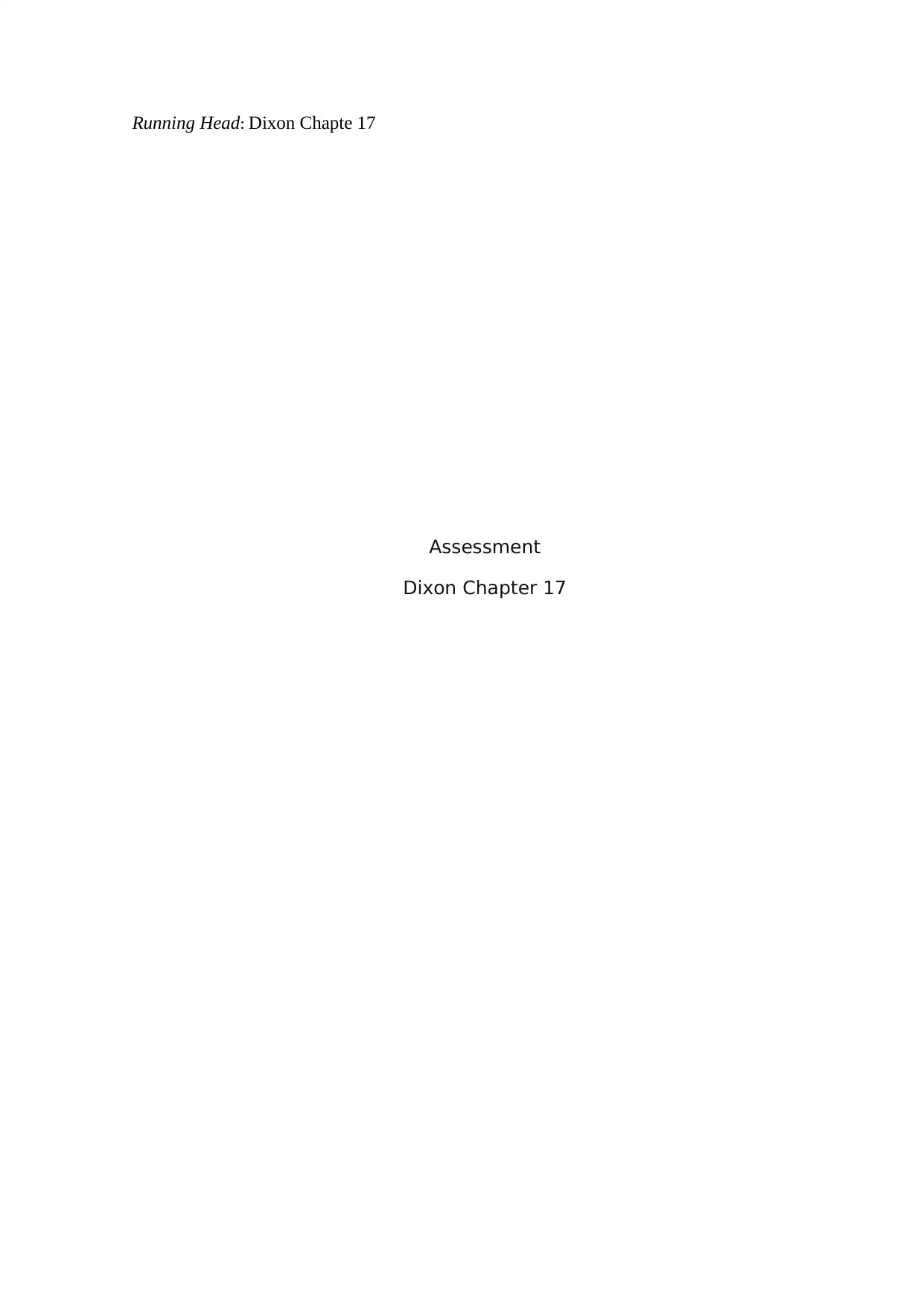
Running Head: Dixon Chapte 17
Assessment
Dixon Chapter 17
Assessment
Dixon Chapter 17
Paraphrase This Document
Need a fresh take? Get an instant paraphrase of this document with our AI Paraphraser
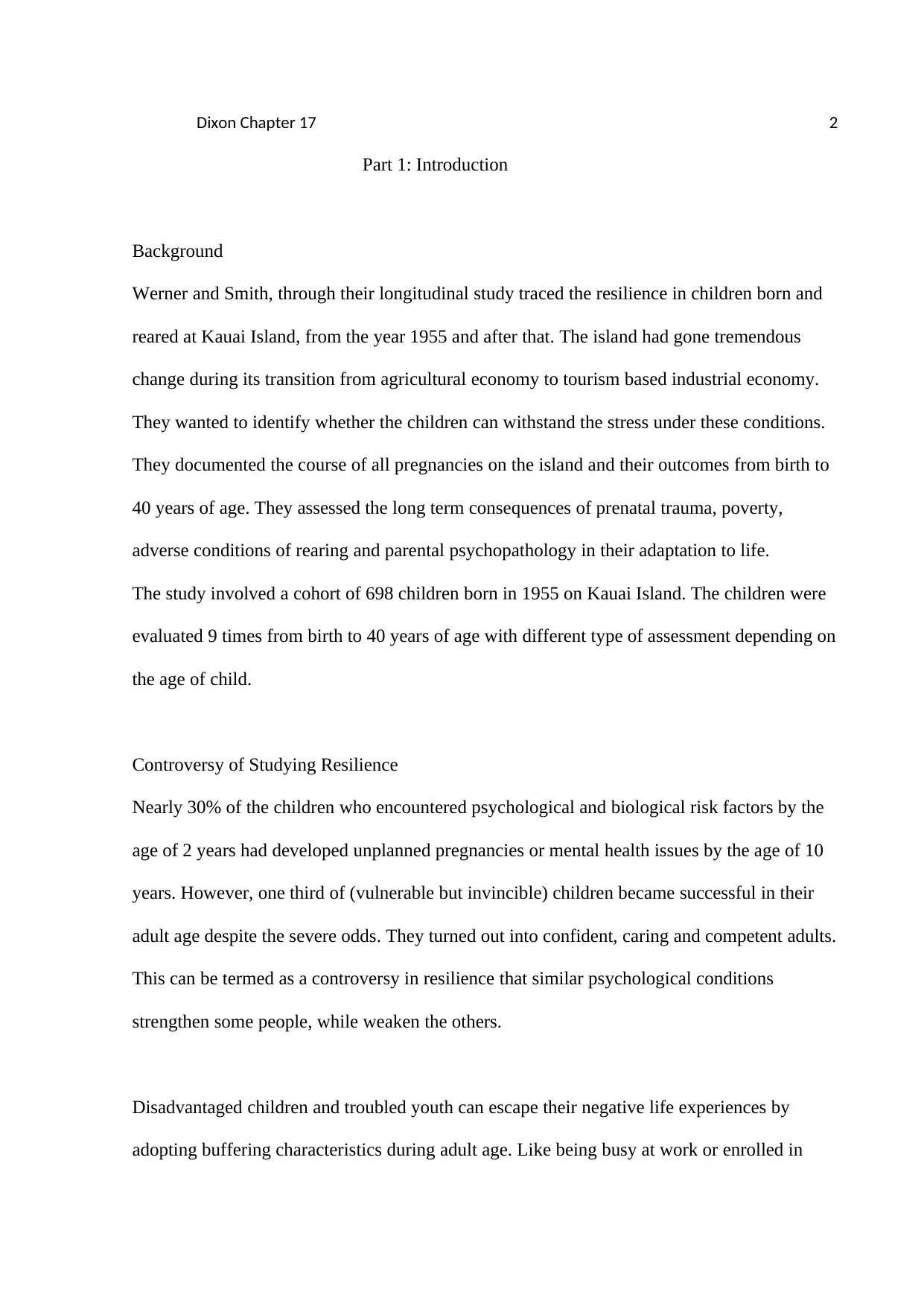
Dixon Chapter 17 2
Part 1: Introduction
Background
Werner and Smith, through their longitudinal study traced the resilience in children born and
reared at Kauai Island, from the year 1955 and after that. The island had gone tremendous
change during its transition from agricultural economy to tourism based industrial economy.
They wanted to identify whether the children can withstand the stress under these conditions.
They documented the course of all pregnancies on the island and their outcomes from birth to
40 years of age. They assessed the long term consequences of prenatal trauma, poverty,
adverse conditions of rearing and parental psychopathology in their adaptation to life.
The study involved a cohort of 698 children born in 1955 on Kauai Island. The children were
evaluated 9 times from birth to 40 years of age with different type of assessment depending on
the age of child.
Controversy of Studying Resilience
Nearly 30% of the children who encountered psychological and biological risk factors by the
age of 2 years had developed unplanned pregnancies or mental health issues by the age of 10
years. However, one third of (vulnerable but invincible) children became successful in their
adult age despite the severe odds. They turned out into confident, caring and competent adults.
This can be termed as a controversy in resilience that similar psychological conditions
strengthen some people, while weaken the others.
Disadvantaged children and troubled youth can escape their negative life experiences by
adopting buffering characteristics during adult age. Like being busy at work or enrolled in
Part 1: Introduction
Background
Werner and Smith, through their longitudinal study traced the resilience in children born and
reared at Kauai Island, from the year 1955 and after that. The island had gone tremendous
change during its transition from agricultural economy to tourism based industrial economy.
They wanted to identify whether the children can withstand the stress under these conditions.
They documented the course of all pregnancies on the island and their outcomes from birth to
40 years of age. They assessed the long term consequences of prenatal trauma, poverty,
adverse conditions of rearing and parental psychopathology in their adaptation to life.
The study involved a cohort of 698 children born in 1955 on Kauai Island. The children were
evaluated 9 times from birth to 40 years of age with different type of assessment depending on
the age of child.
Controversy of Studying Resilience
Nearly 30% of the children who encountered psychological and biological risk factors by the
age of 2 years had developed unplanned pregnancies or mental health issues by the age of 10
years. However, one third of (vulnerable but invincible) children became successful in their
adult age despite the severe odds. They turned out into confident, caring and competent adults.
This can be termed as a controversy in resilience that similar psychological conditions
strengthen some people, while weaken the others.
Disadvantaged children and troubled youth can escape their negative life experiences by
adopting buffering characteristics during adult age. Like being busy at work or enrolled in
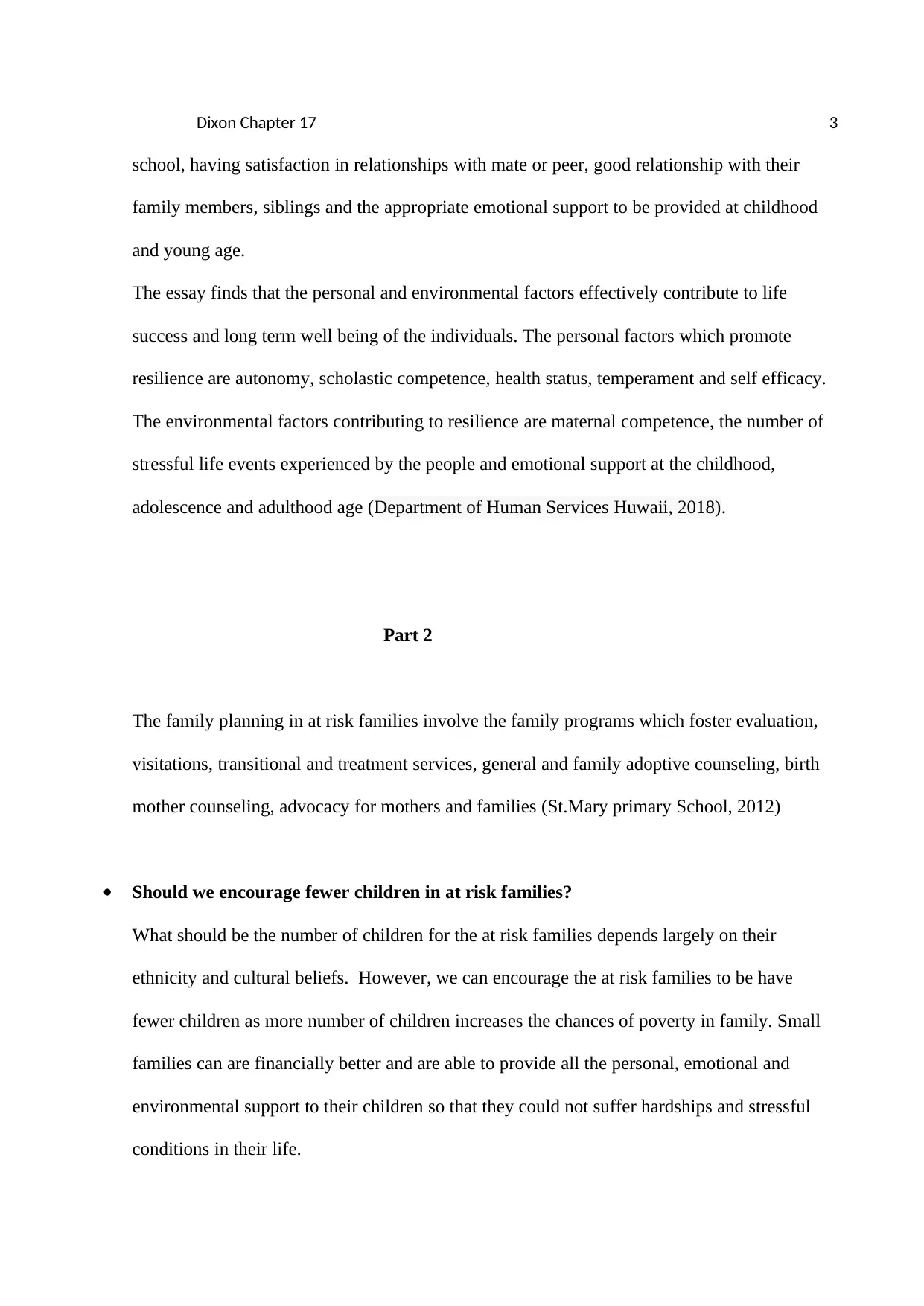
Dixon Chapter 17 3
school, having satisfaction in relationships with mate or peer, good relationship with their
family members, siblings and the appropriate emotional support to be provided at childhood
and young age.
The essay finds that the personal and environmental factors effectively contribute to life
success and long term well being of the individuals. The personal factors which promote
resilience are autonomy, scholastic competence, health status, temperament and self efficacy.
The environmental factors contributing to resilience are maternal competence, the number of
stressful life events experienced by the people and emotional support at the childhood,
adolescence and adulthood age (Department of Human Services Huwaii, 2018).
Part 2
The family planning in at risk families involve the family programs which foster evaluation,
visitations, transitional and treatment services, general and family adoptive counseling, birth
mother counseling, advocacy for mothers and families (St.Mary primary School, 2012)
Should we encourage fewer children in at risk families?
What should be the number of children for the at risk families depends largely on their
ethnicity and cultural beliefs. However, we can encourage the at risk families to be have
fewer children as more number of children increases the chances of poverty in family. Small
families can are financially better and are able to provide all the personal, emotional and
environmental support to their children so that they could not suffer hardships and stressful
conditions in their life.
school, having satisfaction in relationships with mate or peer, good relationship with their
family members, siblings and the appropriate emotional support to be provided at childhood
and young age.
The essay finds that the personal and environmental factors effectively contribute to life
success and long term well being of the individuals. The personal factors which promote
resilience are autonomy, scholastic competence, health status, temperament and self efficacy.
The environmental factors contributing to resilience are maternal competence, the number of
stressful life events experienced by the people and emotional support at the childhood,
adolescence and adulthood age (Department of Human Services Huwaii, 2018).
Part 2
The family planning in at risk families involve the family programs which foster evaluation,
visitations, transitional and treatment services, general and family adoptive counseling, birth
mother counseling, advocacy for mothers and families (St.Mary primary School, 2012)
Should we encourage fewer children in at risk families?
What should be the number of children for the at risk families depends largely on their
ethnicity and cultural beliefs. However, we can encourage the at risk families to be have
fewer children as more number of children increases the chances of poverty in family. Small
families can are financially better and are able to provide all the personal, emotional and
environmental support to their children so that they could not suffer hardships and stressful
conditions in their life.
⊘ This is a preview!⊘
Do you want full access?
Subscribe today to unlock all pages.

Trusted by 1+ million students worldwide
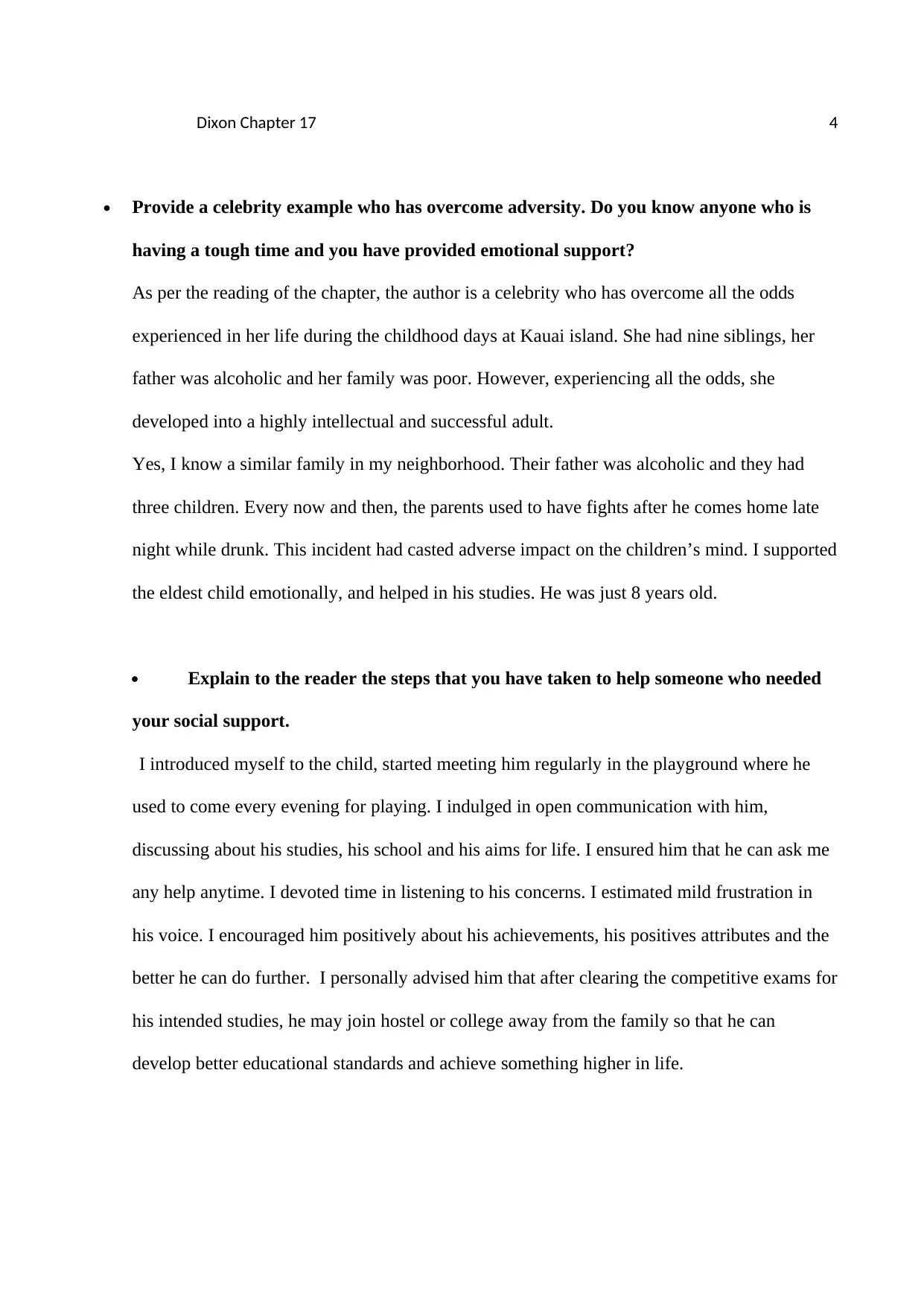
Dixon Chapter 17 4
Provide a celebrity example who has overcome adversity. Do you know anyone who is
having a tough time and you have provided emotional support?
As per the reading of the chapter, the author is a celebrity who has overcome all the odds
experienced in her life during the childhood days at Kauai island. She had nine siblings, her
father was alcoholic and her family was poor. However, experiencing all the odds, she
developed into a highly intellectual and successful adult.
Yes, I know a similar family in my neighborhood. Their father was alcoholic and they had
three children. Every now and then, the parents used to have fights after he comes home late
night while drunk. This incident had casted adverse impact on the children’s mind. I supported
the eldest child emotionally, and helped in his studies. He was just 8 years old.
Explain to the reader the steps that you have taken to help someone who needed
your social support.
I introduced myself to the child, started meeting him regularly in the playground where he
used to come every evening for playing. I indulged in open communication with him,
discussing about his studies, his school and his aims for life. I ensured him that he can ask me
any help anytime. I devoted time in listening to his concerns. I estimated mild frustration in
his voice. I encouraged him positively about his achievements, his positives attributes and the
better he can do further. I personally advised him that after clearing the competitive exams for
his intended studies, he may join hostel or college away from the family so that he can
develop better educational standards and achieve something higher in life.
Provide a celebrity example who has overcome adversity. Do you know anyone who is
having a tough time and you have provided emotional support?
As per the reading of the chapter, the author is a celebrity who has overcome all the odds
experienced in her life during the childhood days at Kauai island. She had nine siblings, her
father was alcoholic and her family was poor. However, experiencing all the odds, she
developed into a highly intellectual and successful adult.
Yes, I know a similar family in my neighborhood. Their father was alcoholic and they had
three children. Every now and then, the parents used to have fights after he comes home late
night while drunk. This incident had casted adverse impact on the children’s mind. I supported
the eldest child emotionally, and helped in his studies. He was just 8 years old.
Explain to the reader the steps that you have taken to help someone who needed
your social support.
I introduced myself to the child, started meeting him regularly in the playground where he
used to come every evening for playing. I indulged in open communication with him,
discussing about his studies, his school and his aims for life. I ensured him that he can ask me
any help anytime. I devoted time in listening to his concerns. I estimated mild frustration in
his voice. I encouraged him positively about his achievements, his positives attributes and the
better he can do further. I personally advised him that after clearing the competitive exams for
his intended studies, he may join hostel or college away from the family so that he can
develop better educational standards and achieve something higher in life.
Paraphrase This Document
Need a fresh take? Get an instant paraphrase of this document with our AI Paraphraser
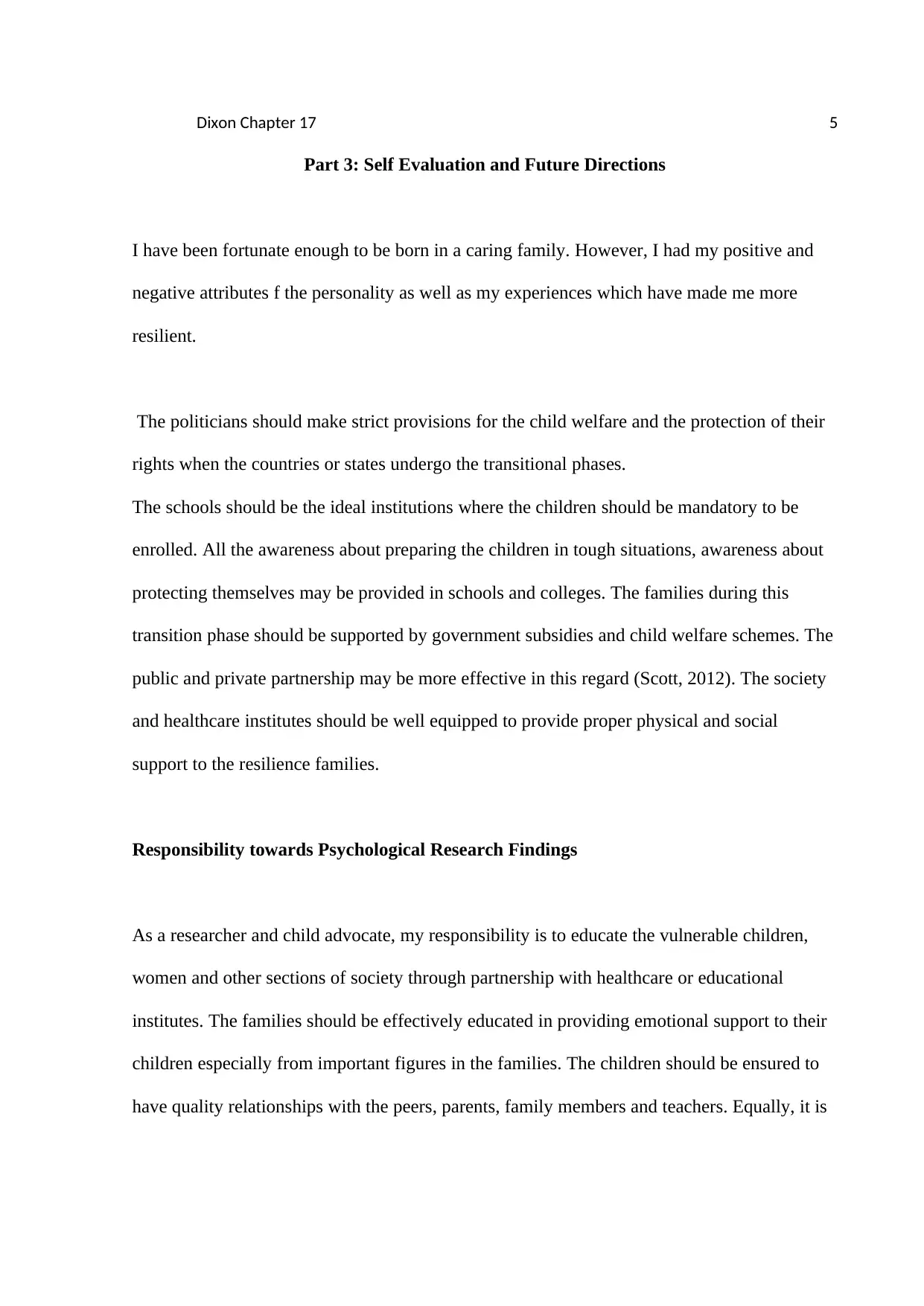
Dixon Chapter 17 5
Part 3: Self Evaluation and Future Directions
I have been fortunate enough to be born in a caring family. However, I had my positive and
negative attributes f the personality as well as my experiences which have made me more
resilient.
The politicians should make strict provisions for the child welfare and the protection of their
rights when the countries or states undergo the transitional phases.
The schools should be the ideal institutions where the children should be mandatory to be
enrolled. All the awareness about preparing the children in tough situations, awareness about
protecting themselves may be provided in schools and colleges. The families during this
transition phase should be supported by government subsidies and child welfare schemes. The
public and private partnership may be more effective in this regard (Scott, 2012). The society
and healthcare institutes should be well equipped to provide proper physical and social
support to the resilience families.
Responsibility towards Psychological Research Findings
As a researcher and child advocate, my responsibility is to educate the vulnerable children,
women and other sections of society through partnership with healthcare or educational
institutes. The families should be effectively educated in providing emotional support to their
children especially from important figures in the families. The children should be ensured to
have quality relationships with the peers, parents, family members and teachers. Equally, it is
Part 3: Self Evaluation and Future Directions
I have been fortunate enough to be born in a caring family. However, I had my positive and
negative attributes f the personality as well as my experiences which have made me more
resilient.
The politicians should make strict provisions for the child welfare and the protection of their
rights when the countries or states undergo the transitional phases.
The schools should be the ideal institutions where the children should be mandatory to be
enrolled. All the awareness about preparing the children in tough situations, awareness about
protecting themselves may be provided in schools and colleges. The families during this
transition phase should be supported by government subsidies and child welfare schemes. The
public and private partnership may be more effective in this regard (Scott, 2012). The society
and healthcare institutes should be well equipped to provide proper physical and social
support to the resilience families.
Responsibility towards Psychological Research Findings
As a researcher and child advocate, my responsibility is to educate the vulnerable children,
women and other sections of society through partnership with healthcare or educational
institutes. The families should be effectively educated in providing emotional support to their
children especially from important figures in the families. The children should be ensured to
have quality relationships with the peers, parents, family members and teachers. Equally, it is
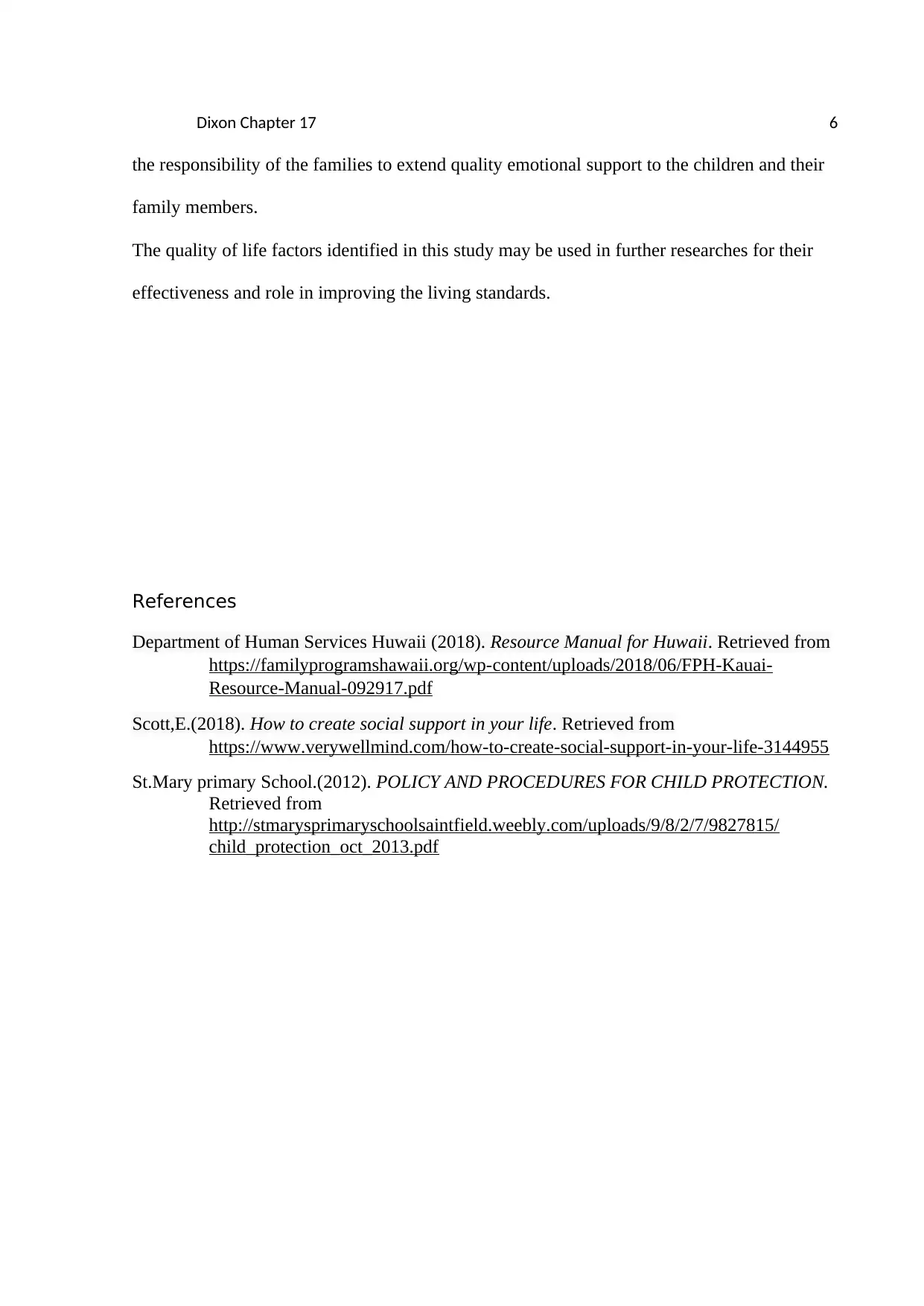
Dixon Chapter 17 6
the responsibility of the families to extend quality emotional support to the children and their
family members.
The quality of life factors identified in this study may be used in further researches for their
effectiveness and role in improving the living standards.
References
Department of Human Services Huwaii (2018). Resource Manual for Huwaii. Retrieved from
https://familyprogramshawaii.org/wp-content/uploads/2018/06/FPH-Kauai-
Resource-Manual-092917.pdf
Scott,E.(2018). How to create social support in your life. Retrieved from
https://www.verywellmind.com/how-to-create-social-support-in-your-life-3144955
St.Mary primary School.(2012). POLICY AND PROCEDURES FOR CHILD PROTECTION.
Retrieved from
http://stmarysprimaryschoolsaintfield.weebly.com/uploads/9/8/2/7/9827815/
child_protection_oct_2013.pdf
the responsibility of the families to extend quality emotional support to the children and their
family members.
The quality of life factors identified in this study may be used in further researches for their
effectiveness and role in improving the living standards.
References
Department of Human Services Huwaii (2018). Resource Manual for Huwaii. Retrieved from
https://familyprogramshawaii.org/wp-content/uploads/2018/06/FPH-Kauai-
Resource-Manual-092917.pdf
Scott,E.(2018). How to create social support in your life. Retrieved from
https://www.verywellmind.com/how-to-create-social-support-in-your-life-3144955
St.Mary primary School.(2012). POLICY AND PROCEDURES FOR CHILD PROTECTION.
Retrieved from
http://stmarysprimaryschoolsaintfield.weebly.com/uploads/9/8/2/7/9827815/
child_protection_oct_2013.pdf
⊘ This is a preview!⊘
Do you want full access?
Subscribe today to unlock all pages.

Trusted by 1+ million students worldwide
1 out of 6
Related Documents
Your All-in-One AI-Powered Toolkit for Academic Success.
+13062052269
info@desklib.com
Available 24*7 on WhatsApp / Email
![[object Object]](/_next/static/media/star-bottom.7253800d.svg)
Unlock your academic potential
Copyright © 2020–2025 A2Z Services. All Rights Reserved. Developed and managed by ZUCOL.





